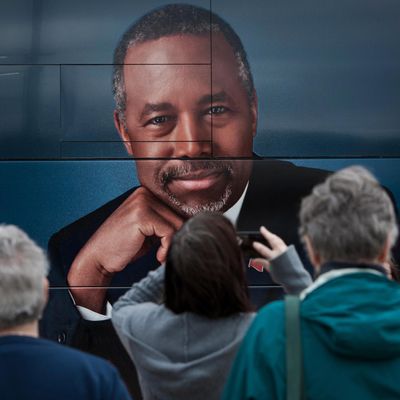
On February 7, 2013, Ben Carson appeared at a National Prayer Breakfast, where he visibly annoyed President Obama by delivering a right-wing speech denouncing Obamacare and cultural liberalism, and calling for a flat tax based on the biblical tithe. Conservatives, still devastated by Obama’s reelection, took delight in the appearance on the scene of a surprising new presidential antagonist, who until that point had no political profile. “Finally, a self-reliant conservative decided to make this every bit as political as Obama does,” tweeted conservative pundit David Limbaugh. The Wall Street Journal celebrated Carson’s remarks in a short editorial, headlined “Ben Carson for President.” The headline was obviously hyperbolic; nothing in the text that followed proposed that Carson run for public office.
But now Carson actually is running for president. Or is he? It is hard to tell. Conservative politics are so closely intermingled with a lucrative entertainment complex that it is frequently impossible to distinguish between a political project (that is, something designed to result in policy change) and a money-making venture. Declaring yourself a presidential candidate gives you access to millions of dollars’ worth of free media attention that can build a valuable brand. So the mere fact that Carson calls himself a presidential candidate does not prove he is actually running for president rather than taking advantage of the opportunity to build his brand. Indeed, it is possible to be actually leading the polls without seriously trying to win the presidency.
And the notion that Carson could be president is preposterous. The problem is not only that he has never run for elected office. He has never managed a large organization; he has not worked in and around public policy, and he lacks a competent grasp of issues. His stance on health care, the closest thing to an issue with which his professional experience has brought him into contact, is gibberish. He mostly thrills audiences by scoffing at evolution and insisting Muslims be barred from the presidency, stances he cannot even defend coherently.
It is possible that Carson has come to genuinely believe that he is qualified to serve as president. (As a follower of the conspiracy theorist W. Cleon Skousen, Carson seems to subscribe in earnest to a series of completely fantastical beliefs.) It is also possible that Carson is being manipulated by staffers who stand to profit off their association with him. But the most likely explanation for his behavior is that Carson himself is in this thing to make a lot of money.
Carson is doing a lot of things that seem puzzling for a presidential campaign, but quite logical for a brand-building exercise. He is taking weeks off the campaign trail to go on a book tour. His campaign itself is structured much more like a scamming venture than a political one. An astronomical 69 percent of his fund-raising totals are spent on more fund-raising. (Bernie Sanders, by contrast, spends just 4 percent of his intake on fund-raising.) In addition to direct mail, Carson seems to have undertaken a massive phone-spamming operation. Spending most of your money to raise more money is not a good way to get elected president, but it is a good way to build a massive list of supporters that can later be monetized. Perhaps it is a giveaway that the official title for Armstrong Williams, the figure running the Carson “campaign,” is “business manager,” as opposed to “campaign manager.” It does suggests that Carson is engaged in a for-profit venture.
Carson’s combination of flamboyantly reactionary statements and subdued (to the point of appearing medicated) persona lend him an aura of trust and honesty. Carson’s supporters see him as a brave truth-teller; his critics think he’s genuinely nuts. Even those concerned with his methods grant him the presumption of innocence — right-wing commentator Erick Erickson, running down Carson’s astronomical fund-raising costs, frets, “I suspect there are some who see Carson as a cash cow.” But it is a fallacy to imagine that a kook cannot also be a scammer. There is a long tradition of cult leaders, televangelists, and other snake-oil salesmen who were both.
Carson’s relationship with Mannatech, a medical-supplement operator that uses misleading claims to exploit Christian customers, may provide the most revealing window into his methodology. Consider the utterly calm and putatively genuine way in which Carson flatly denied a question at the last debate about his business relationship with Mannatech:
If you have the facts in mind — Carson maintained an extensive relationship with the company — when you watch this answer, his unflinching dishonesty has a chilling quality. He is a perfect con artist. And his history with Mannatech seems to serve as a precursor to his current enterprise. Carson used his inspiring story to pitch credulous (overwhelmingly Christian) customers. Carson has simply moved on to a bigger stage and cut out the middleman. The old scam was using the Ben Carson brand to pitch Mannatech. The new scam is pitching Ben Carson.






























